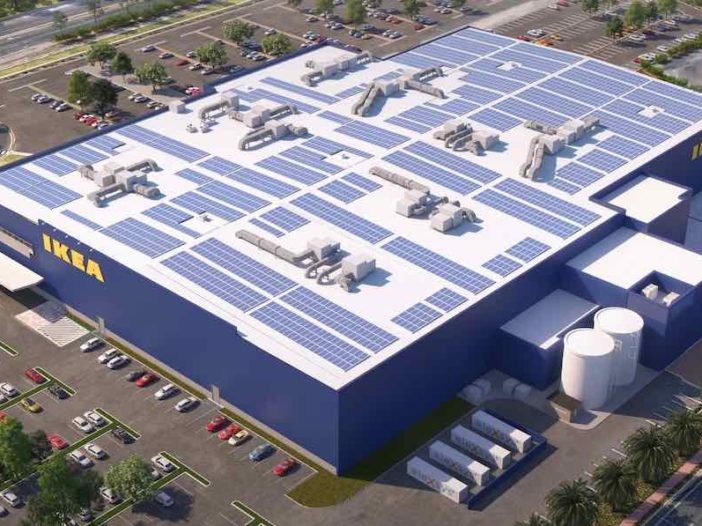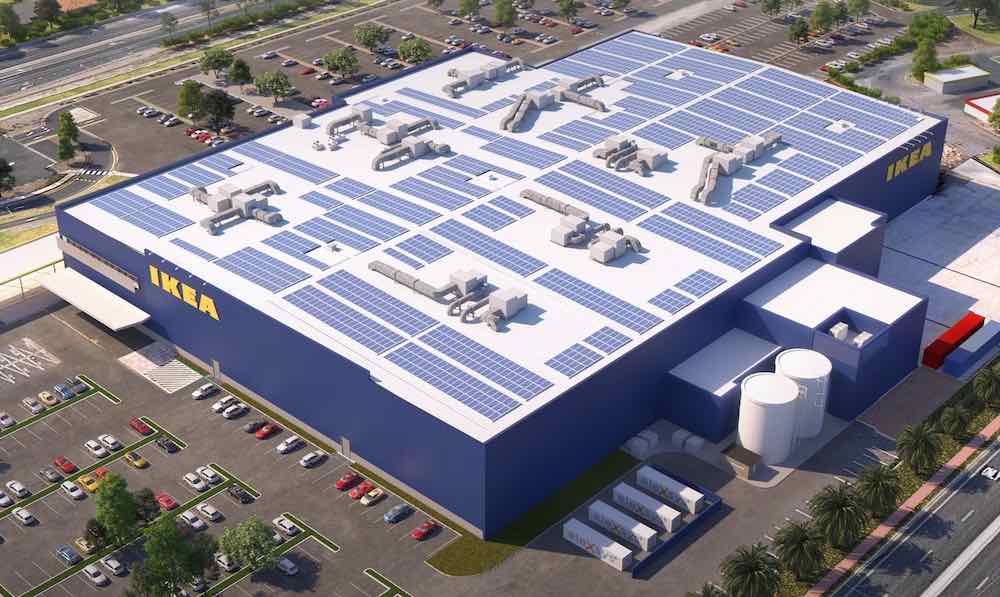
Swedish furniture giant and sometimes rooftop PV retailer Ikea is about to begin work on an industry-leading, grid-connected commercial solar and battery microgrid based on its Adelaide store.
The project, flagged by Ikea Australia in June at the launch of its Solstråle residential solar offering, is being developed in conjunction with Planet Ark Power, the South Australian government, SA Power Networks and Epic Energy.
The $6.6 million first stage of the microgrid, which will be owned and operated by Epic Energy, will install 1.2MW of solar on the rooftop of Ikea Adelaide and a 3MW/3.4MWh OilPower CATL lithium-ion battery storage system, also installed on-site in three 40 foot containers.
The solar and storage system will be managed through a combination of Schneider Electrics’ smart energy management software and, on the grid-connected side, Planet Ark Power’s award-winning eleXsys dynamic voltage control platform, the hardware for which will be housed in an additional 20 foot container.
For Ikea, the 3024 Q-Cell PV panels and battery storage will – at the end of stage one mid-way through next year – provide more than 70 per cent of the store’s electricity needs, which will be delivered via a power purchase agreement with Epic Energy.
But the project also gives the furniture giant some serious green cred – on top of having already met its company-wide target to produce and procure more renewable energy than it consumes by this year, 2020.
“Collaborations like this have always been a cornerstone of the Ikea way – this is more important now than ever in order to tackle the climate crisis,” said the global head of climate and energy for Ingka Group, Karol Gobczyński.
“Change will only come if we work together. …Ikea Australia is taking action together with our customers, partners and governments to do our part in creating society powered by 100% renewable energy.”
“Ikea Australia is excited to be working with such inspirational partners to help shift the dial on clean energy production in Australia,” added Jan Gardberg, Ikea Australia’s CEO and chief sustainability officer, in comments on Wednesday.
“Our ambition is to be the first mover and inspire other Ikea stores to install larger solar installations, batteries and digital solutions. Planet Ark Power’s eleXsys energy management system will support the balancing of the electricity grid not just on stores in Australia, but across the Ikea network around the world.”
For Brisbane-based Planet Ark Power, participation in the Adelaide microgrid and the ongoing partnership with Ikea marks the culmination of seven years of hard work developing a world-leading grid integration solution that manages two-way flows of energy by making smarter use of existing electricity infrastructure.
And the technology is attracting a good deal of interest beyond Australia. In April of last year, eleXsys won the 2019 Start-Up Energy Transition (SET) Awards supported by the World Energy Council in Berlin.
“The inclusion of Planet Ark Power’s unique eleXsys energy management system is the critical link that makes the Ikea, grid-connected microgrid project so innovative and world leading,” said the company’s COO, Jonathan Ruddick, on Wednesday.
“Our eleXsys technology solution functions to ensure certainty of revenue streams from the export of surplus solar energy and grid stability services into the grid without the risk of curtailment by electricity network operators,” he said.
“We are particularly proud to contribute to the IKEA journey to achieve 100% renewable energy at their Adelaide site while also helping SA Power Networks provide more secure, clean energy to the broader South Australian community.”
Ruddick, in an interview with One Step Off The Grid this week, said Planet Ark Power and its dynamic solar management solution, was formed by former senior electrical engineers on Queensland’s government-owned networks, who had watched as voltage instability issues started to arise from the first flush of residential solar installs in the Sunshine State.
“Our tech solution solves this challenge of zero export restrictions being applied,” Ruddick said. “What we’re doing is bringing those large remote solar and wind farms into the urban environment where the energy is actually needed, avoiding transmission costs, and giving confidence that voltage management is being provided dynamically.
“Once you solve those zero export issues, the investment becomes de-risked… and that’s where Epic Energy comes into the fold, and enters a PPA (power purchase agreement) with Ikea based on de-risked or predictable investment returns.
“This results in a new investment class which we call Microgrids as a Service (MAS). These can be used by industrial zones to install optimised rooftop solar and offer the sort of predictable returns on investment that are currently bedeviling the big solar farms.”
In the case of the Ikea MAS, Planet Ark Power will be offering all of the bells and whistles of its energy management system, including dynamic voltage management, generation capacity enhancement, and load and voltage balancing.
EleXsys will also be used to optimise the microgrid’s operation by operating as a fast response balance between generation and load, and will use the battery to balance load and generation at local level to optimise network utilisation.
The system will also offer network monitoring and visibility, Frequency Control Ancillary Services (FCAS), and independent frequency and harmonics management.
The latter services will likely come into play as part of stage two of the project, which will add a solar shaded car-parking facility and boost the amount of surplus energy to be sold into the grid while continuing to power the site.
This stage will generate a further 30% the store’s energy needs, resulting in Ikea Adelaide becoming 100% powered by onsite renewable generation.
Following this, the aim is for Ikea and its partners to investigate the viability of hydrogen energy being generated on site, and of Ikea becoming an energy provider, able to generate and and sell renewable energy to the grid.
For the near-term, however, the focus is on taking Ikea Adelaide to 70 per cent renewable in a way that seamlessly brings benefits to the broader grid, rather than headaches.
“Epic Energy believes this project – and decentralised generation more broadly – sets the foundation for a sustainable new energy model for Australia, that will play an important role in Australia’s energy mix over the coming years,” says Epic Energy CEO Clive D’ Cruz.
“Our involvement demonstrates the attractiveness of investing in projects that can safely, securely and reliably export surplus clean energy into low voltage urban networks.”
And for the South Australian government, whose Renewable Technology Fund contributed $1.95 million in funding to the project, the microgrid offers another piece of the puzzle for the state’s world-leading shift to a majority renewables-powered grid.
“Solar power and battery with Schneider’s microgrid management systems and Planet Ark Power’s voltage management system… [will] together allow Ikea to help SA Power Networks to manage the local network to improve the quality of power to nearby homes and businesses,” state energy minister Dan van Holst Pellekaan said on Wednesday.
“The project will let Ikea significantly reduce its carbon footprint and make it easier for other companies to adopt low carbon technologies … and is a significant project for the state.”

Sophie is editor of One Step Off The Grid and deputy editor of its sister site, Renew Economy. Sophie has been writing about clean energy for more than a decade.

